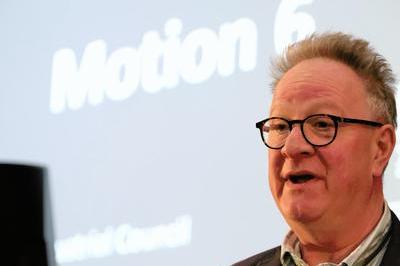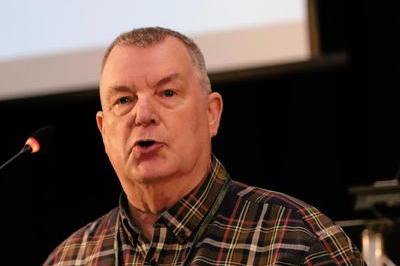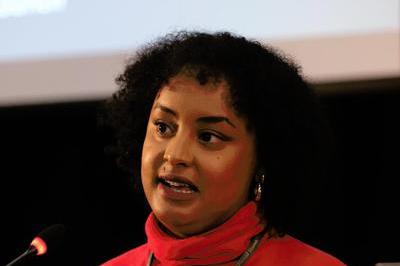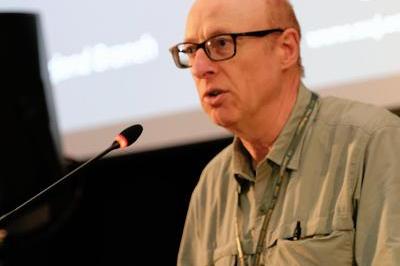DM2025: artificial intelligence
Motions on artificial intelligence including related ethical concerns were debated.
The NUJ’s campaigning on AI has called for greater transparency around the use of copyright protected works by developers without consent. Motions on the subject at this year’s DM included motion four from the National Executive Council calling for ongoing contribution to the TUC’s AI working group and for freelance members likely to be copyright owners to be fully represented both in negotiations with employers and governments.

Tim Dawson
© Jess Hurd
Tim Dawson from the NEC moved the motion. He said: “we are all concerned about the impact AI might have on our working lives. The most important thing we can make a difference with is what trade unions do. In our own workplaces in our chapels, making the control on how AI is deployed central to our bargaining, central to our work, central to how we represent our members.”
The motion was carried.
Remaining on the subject of AI, a speaker on behalf of the New Media Industrial Council called for the control of AI within newsrooms to remain at the heart of the union’s industrial policy. Jonathan Jewell, speaking for the motion on behalf of the NUJ Health and Safety Committee said the work being carried out with the TUC’s AI Working Group should continue. Motion six as amended by the NEC and Health and Safety Committe was carried by DM.
Conference agreed to the creation of a training package for full time and lay officials on AI in a motion brought by Derry NW Ireland Branch. Dara MacDonald speaking on behalf of the motion said, “the advance of technology has been exponential.” He said although AI could not be stopped, “we can harness the resources at our disposal.”

David Nicholson
© Jess Hurd
The motion noted the union’s long affirmed position that AI is no substitute for journalism. Motion seven was supported by the union’s Irish Executive Council. David Nicholson speaking in support of the motion on behalf of the NEC, said training is the key, and referenced Fast Skills Friday course developed in Wales on artificial intelligence. He invited delegates to join the half-day training course.
Delegates also passed motion eight on the need for guidance on the use of AI in newsrooms. Martin Shipton from South Wales Branch and the Welsh Executive Council said, “there can be great negativities to AI.” He noted examples where AI had produced inaccurate information, presented as fact. Simon Barrow, seconding the motion from the Ethics Council said there were a range of ethical issues involved in AI, including on the danger of perpetuating mistakes through databases, “hallucinations” and issues related to transparency and copyright.

Huda Elmi
© Jess Hurd
Huda Elmi, NUJ national organiser, said AI cannot replace the talent, creativity or skillset held by members in sectors.
Motion nine tabled by South West England Branch highlighted the potential impact of AI’s effect on jobs and workloads, and for its effect in undermining editorial integrity and the public’s trust in the media. Speaking for the motion, Ray Tostevin, first time delegate, said, “with AI many of our colleagues, journalists, artists, photographers face the very real prospect of their work being stolen.” He said the impact of AI is being felt in newsrooms everywhere, undermining editorial integrity. Simon Chapman seconding the motion on behalf of the NEC, said as a freelance it was ‘entirely impractical’ to opt-out of his work spanning over two decades.

Simon Chapman
© Jess Hurd
The motion instructing the NEC to lobby government and support campaigns calling for creators’ works to be used on an opt-in basis with consent granted, and not through opt-out processes was passed by delegates.
Laura Davison, NUJ general secretary, confirmed the union centrally had been in discussion with the TUC about work by the Community Union and would be in contact with the union too.
Pennie Quinton moving motion 10 on behalf of London Freelance branch said the union must resist efforts by technology companies but noted AI was also being used in other sectors, including in education. Anna Herve, speaking in support for the NEC said protection of copyright was always her first priority. She noted the significant contribution of the UK’s creative industries to the UK economy.
Conference also passed a motion focused on the importance of digital accessibility, calling for lobbying of big tech companies who run search engines to rank search results using accessibility.
